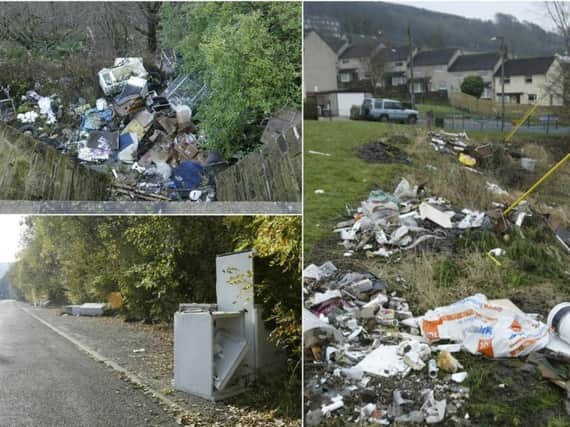Fly tipping punishment in Calderdale will fit the crime vow councillors


Success of enforcement policy, including fly-tipping and which Calderdale Council’s Cabinet is recommended to approve on Monday, depends on catching the culprits.
Andrew Pitts, the council’s Head of Neighbourhoods, attending with two of his officers, told Place Scrutiny Board members a three-strand approach would enable the council to deal with issues of fly-tipping quicker, punish the wrongdoers and also educate people to change their behaviour in some cases.
Advertisement
Hide AdAdvertisement
Hide AdThe council has acknowledged the amount of fly-tipping in recent years has been unacceptable – there were well over 2,500 incidents last year alone, just over half in the Halifax area, other incidents split roughly equally between the upper and lower Calder Valley.
And it needs to change a perception the public have that it is something of a soft touch where the issue is concerned because it upsets residents who have to live with it and costs the council money to deal with it.
With most of 15 steps to improvement approved by council three years ago now in place the aim is to make it easier for the public to report examples of fly-tipping and littering, make it more difficult to fly-tip some areas and use technology as well as good intelligence to track down fly-tippers and punish them appropriately alongside awareness campaigns aimed at getting people to behave better.
Mr Pitts said the council would consider action against offenders, prompting a response from Coun Peter Caffrey (Con, Northowram and Shelf) that “I would not like ‘will consider’ – I want us to ‘take action’.”
Advertisement
Hide AdAdvertisement
Hide AdMr Pitts said: “The default position as far as we are concerned is that this council will take action rather than consider it, unless there’s a good reason it can’t.”
Making it easier for the public to report problems, smarter analysis of the data gained and swift co-ordinated action taken rather than a piecemeal approach depending on which council department a location fell under, which has previously been the case, would enable problems to be identified and dealt with quickly.
In some places it could be easy to physically deter tippers by making it more difficult but technology, much advanced even on ten years ago and of a sufficient standard to properly fit the purpose, would also be used in hot spots to catch illegal dumping in the act, said Mr Pitts.
And detective work would also play a role.
“Quite often they are careless, they leave data fingerprints that connect them to fly-tipping. In one case we’ve got a whole address book,” said Mr Pitts.
Advertisement
Hide AdAdvertisement
Hide AdThe onus would be on people whose rubbish was found to prove they had discharged their duty that they had disposed of their waste legally rather than the council having to prove someone had dumped it, thanks to recent changes in legislation.
Paying someone such as a “man and van” to take it away without checking they had the legal means of disposing of it would not be an excuse, councillors heard. If such assurances had been sought the council would then bill the waste carrier for clear-up.
Punishments would be those which were most effective for the council and community, said Mr Pitts.
The council would not hesitate to take court action – which but depending on circumstances needs certain levels of proof – if a case warranted it but increased use of parking-ticket style fixed penalty notices would be introduced, possibly with punishments of up to £200, but policy detail, for example whether to offer a discount for early payment as in parking, had yet to be decided.
Advertisement
Hide AdAdvertisement
Hide AdThe armoury ranged from full-scale court cases to the on-the-spot fines via anti-social behaviour orders, councillors heard.
In short the council would weight up the desired outcome in each case, working in cost and resources to identify the most appropriate form of punishment – but issues would not be ignored.
Councillors asked questions about issues in dealing with intimidating serial dumpers, issues of tipping which had taken place on private rather than council land, and cross-border dumping, for example if rubbish from someone in Kirklees had been dumped just across the border in Calderdale.
Mr Pitts said the final strand in the policy was education, with campaigns, initiatives and clean-ups aiming to educate people to behave better when disposing of their rubbish.
Advertisement
Hide AdAdvertisement
Hide AdCabinet member Coun Barry Collins (Lab, Illingworth and Mixenden) told board members they were right to run the rule over progress of the 2016 recommendations and Cabinet would keep pushing the issue too.
Board chair Coun Steven Leigh (Con, Ryburn) summed up members’ feelings: “There is definitely a sense of determination from the team – and we all hope it comes to fruition,” he said.